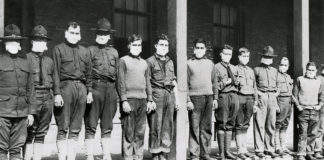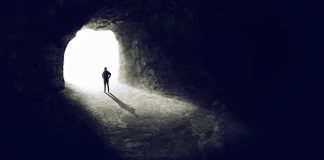How do I know if I’m infected with the new coronavirus or I have a cold / flu?
More and more people who are experiencing the typical symptoms of a cold and flu are asking the question in the title. This article provides essential information that can help us recognize the danger of infection with the new coronavirus.
Steps towards a transforming prayer life
Whenever we acknowledge that our prayers have become a boring exercise rather than a real conversation with a real person, it’s time to explore creative, tried and tested methods to rebuild a meaningful, enthusiastic and transforming prayer life.
Conspiracy: from Lord of the Rings to the era of fake news
Towards the end of the Lord of the Rings trilogy, there is a final showdown between Frodo and Smeagol. Smeagol tries to regain possession of "My Precious", and when Frodo resists, Smeagol tries to strangle him. One scene in this part shows Frodo shocked that Smeagol has broken his promise and, though on the brink of death, sees fit to plead for honour:...
“Divine Providence: God’s Love and Human Freedom” | Book review
Bruce Reichenbach's book, Divine Providence: God’s Love and Human Freedom is impressive first of all due to the author’s total disinterest in impressing his readers. Instead, he has a legacy to pass on.
11 million people die each year from these nutrition mistakes
From Europe to Asia and from Africa to the Americas and Australia, none of the culinary traditions, not even those acclaimed by scientists, generate an optimal supply of nutrients. Moreover, the food we eat daily kills 11 million of us prematurely every year. So then, what should we eat?
How can I know God as He is, rather than as I imagine Him to be?
To know God is an aspiration inherent in the rational being who recognises His existence.
The ideal of a couple
I recently watched a TV show in which the guests, which included professors and psychotherapists, when asked about the feminine ideal in the contemporary world, expressed opinions that seemed strange to me: that such an ideal would no longer be detectable or would no longer have a purpose, today...
Spanish flu to COVID-19: Lessons from a forgotten pandemic
The Spanish flu filled graves in almost every cemetery in the world. However, surprisingly, this tragedy had largely been forgotten until recently. A century later, the issue returned to the centre of attention, with specialists wondering if they can identify a pattern in the evolution of the COVID-19 health crisis based on the pandemic from a century ago.
Hungry for youth and immortality
Crouched in the trenches of the horror of old age, modern individuals no longer wish to recover anything from the natural ageing process that their ancestors practised with such serenity. On the contrary, the first signs of physical decline become the raw material for a wide range of efforts (from picturesque to sickly) to forge a youth that the mirror refuses to restore.
Health begins with accurate information
A healthy lifestyle starts with acquiring information properly. In a world flooded with information, patients are often confused and overwhelmed by conflicting nutritional recommendations and spectacular promises about proposed diets. In this context, it is essential to assess the validity of information using well-established criteria.
Divergence and confluence
My daughter recently posted on our family website a photo of our niece celebrating while holding a beautiful fresh rose, tall and slim, just like her. I looked at the photo for a long time then wrote under it: "Two vines." I pondered some more then wrote, "One of these vines knows why it is here on Earth, but I wonder if the...
The tragic divorce
It is not the environment or the circumstances, but the concept of the meaning of life that is fundamental to the course of our lives. Life remains dependent on the value it holds in the mirror of the mind. The way we live is the visible messenger of the invisible inner man. Every form of action is born of faith, and every form...
Good or bad: How we come to love negative characters
It is as surprising as it is real: negative characters like Dexter Morgan, from the eponymous Dexter, and Walter White, from Breaking Bad, have been cropping up in popular culture more and more often lately. Since when, how, and why have anti-heroes gained so much popularity?
“All religions are good.” True or false?
Globally there are 19 major religions, divided in turn into 10,000 religious groups. Each group claims to be the holder of the Truth. If one of them really holds the Truth, that means there are about 9,999 false religious groups.
Community, connection, church
Recently, my wife and I got hooked on a TV show. We’d wait in anticipation for the latest episode each week. The show was Old people’s home for 4-year-olds. The basic premise? Take a class of cheeky, energetic, curious four-year-olds (some of who lacked a filter) and have them spend a significant amount of time with the elderly residents of an aged-care facility.


























